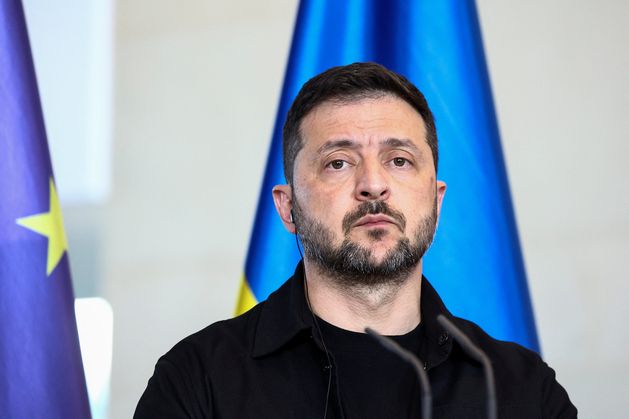“We were able to win the following concession: That the United States could offer Article 5-like protection, which is one of the real reasons why Ukraine wants to be in Nato,” he said on CNN’s State Of The Union.
Mr Witkoff said it was the first time he had heard Mr Putin agree to that.
European Commission president Ursula von der Leyen, speaking at a news conference in Brussels with Ukrainian president Volodymyr Zelensky, said that “we welcome President Trump’s willingness to contribute to Article 5-like security guarantees for Ukraine, and the ‘Coalition of the willing’ – including the European Union – is ready to do its share”.
Mr Witkoff, offering some of the first details of what was discussed at Friday’s summit in Alaska, said the two sides agreed to “robust security guarantees that I would describe as game-changing”.
He added that Russia said that it would make a legislative commitment not to go after any additional territory in Ukraine.
Mr Zelensky thanked the United States for recent signals that Washington is willing to support security guarantees for Ukraine, but said the details remained unclear.
“It is important that America agrees to work with Europe to provide security guarantees for Ukraine,” he said.
“But there are no details how it will work, and what America’s role will be, Europe’s role will be and what the EU can do, and this is our main task, we need security to work in practice like Article 5 of Nato, and we consider EU accession to be part of the security guarantees.”
Mr Zelenskiy, speaking in Brussels on Sunday, said the current front lines in his country’s war against Russia should be the basis for peace talks.
“We need real negotiations, which means we can start where the front line is now,” Zelenskiy said, adding that European leaders supported this.
Zelenskiy reiterated his position that it was necessary to establish a ceasefire in order to then negotiate a final deal.
Mr Witkoff defended Mr Trump’s decision to abandon his push for Russian to agree to an immediate ceasefire, saying the president had pivoted toward a peace deal because so much progress was made.
“We covered almost all the other issues necessary for a peace deal,” Mr Witkoff said, without elaborating.
“We began to see some moderation in the way they’re thinking about getting to a final peace deal,” he said.
European and NATO leaders announced Sunday they will join President Volodymyr Zelenskyy in Washington for talks with President Donald Trump on Monday. They are rallying around the Ukrainian leader after his exclusion from Trump’s summit with Russian President Vladimir Putin.
The remarkable show of solidarity — with leaders from France, Britain and Germany saying they would be at Zelenskyy’s side at the White House on Monday — was an apparent effort to ensure the meeting goes better than the last one in February, when Trump berated Zelenskyy in a heated Oval Office encounter.
“The Europeans are very afraid of the Oval Office scene being repeated and so they want to support Mr. Zelenskyy to the hilt,” said retired French Gen. Dominique Trinquand, a former head of France’s military mission at the United Nations.
“It’s a power struggle and a position of strength that might work with Trump,” he said.
The European leaders’ physical presence to demonstrate their support for Ukraine could potentially help ease concerns in Kyiv and in other European capitals that Ukraine risks being railroaded into a peace deal that Trump says he wants to broker with Russia.
European Commission President Ursula von der Leyen announced on X that she will take part in the talks, “at the request” of Zelenskyy. The secretary-general of the NATO military alliance, Mark Rutte, will also take part in the meeting, his press service said.
The office of President Emmanuel Macron said the French leader will travel “at the side of President Zelenskyy” and that he, too, would visit the White House. British Prime Minister Keir Starmer will also take part in the meeting with Trump, according to a statement from 10 Downing Street.
German Chancellor Friedrich Merz will also be part of the European group. Writing on X, he said he would discuss security guarantees, territorial issues, and further support for Ukraine.
The grouped trip underscored European leaders’ determination to ensure that Europe has a voice in Trump’s attempted peace-making, after the U.S. president’s summit on Friday with Putin — to which Zelenskyy wasn’t invited.
Neil Melvin, director of international security at the London-based Royal United Services Institute, said European leaders are trying to “shape this fast-evolving agenda.” After the Alaska summit, the idea of a ceasefire appears all-but-abandoned, with the narrative shifting towards Putin’s agenda of ensuring Ukraine does not join NATO or even the EU.
